2015 年广西民族大学基础英语考研真题 A 卷
I. Vocabulary (20 points,1 point each)
Directions: Thereare20sentencesinthispart.Eachsentencecontainsawordor
phrasewhichisunderlined.Beloweachsentencearefourotherexpressions.Choose
theonewhichwouldbestkeepthemeaningoftheoriginal,andwritedowntheletter
A, B, C or D on your answer sheet.
1.
Please keep your comments pertinent to the topic under discussion.
A. relevant
B. conforming
C. satisfactory
D. direct
2.
He was deeply committed to political doctrines of social equality.
A. issues
B. beliefs
C. interests
D. basics
3.
His plots are always very ingenious.
A. stupid
B. smart
C. absurd
D. consistent
4.
In this example 'X' denotes the time taken and 'Y' the distance covered.
A. represents
B. points to
C. equals to
D. emphasizes
5.
He didn't give an adequate answer to the question.
A. enough
B. wise
C. prompt
D. satisfactory
6.
A high proportion of crime in any country is perpetrated by young males in
their teens and twenties.
A. committed
B. witnessed
C. perceived
D. restricted
7.
Baldwin enlightened her as to the nature of the experiment.
A. showed
B. explained to
C. warned
D. frightened
8.
Most scientists believe it is legitimate to use animals in medical research.
A. desirable
B. reasonable
C. legal
D. effective
9.
He said he was resigning but did not elaborate on his reasons.
A. explain
B. provide
C. state
D. tell
10. Success in the talks will reinforce his reputation as an international
statesman.
�
A. establish
B. form
C. consolidate
D. threaten
11. We did not realize the magnitude of the problem.
A. essence
B. importance
C. content
D. consequences
12. Sleep has often been thought of as being in some way analogous death.
A. similar
B. close
C. identical
D. related
13. How much to tell terminally ill patients is left to the discretion of the doctor.
A. decision
B. secrets
C. contemplation
D. words
14. The director tried to wave aside these issues as trivial details that could
be settled later.
A. simple
B. unimportant
C. useless
D. inferior
15. Some astronomers contend that the universe may be younger than previously
thought.
A. explain
B. agree
C. think
D. argue
16. It takes time to really understand all these facts.
A. ruminate
B. realize
C. assimilate
D. accept
17. Computers can be used to make language learning easier.
A. facilitate
B. accelerate
B. relieve D. alleviate
18. The selection process is based on rigorous tests of competence and experience.
A. serious
B. thorough
C. difficult
D. demanding
19. He appended a glossary to his novel where he used an invented language.
A. added
B. used
C. included
D. compiled
20. Mr Norris said he was hopeful that his request would elicit a positive response.
A. cause
B. obtain
C. produce
D. call forth
II. Reading Comprehension (80 points)
Directions: Thefollowingtwopassagesarefollowedbysomequestionsorunfinished
statements.ForeachofthemtherearefourchoicesmarkedA,B,CandD.Youshould
�
decide on the best choice and write down the letter on your answer sheet.
Passage 1 (15 points, 3 points each)
One of the great mysteries of the brain is that we still cannot pin down exactly
what a memory is—that is, how neural circuitry stores a given recollection. Yet
in the last decade we have learned a lot about memory’s limitations. Memories are
not necessarily written into our brains like ink on paper. Think of them instead
as inscribed in clay, suggests André Fenton, a neuroscientist at New York
University’s Center for Neural Science. Every time you access a memory, the message
can get smudged, just as a clay tablet might if you were to pick it up and run your
fingers over its surface. Ongoing biochemical processes cause memories to shift
over time.
Further, our mind sets and emotions can influence what we pay attention to and
thus remember. Scientists are tinkering with experimental chemicals that, when
injected, can interfere with memory-forming proteins and erase certain types of
maladaptive feelings, such as an addict’s desire for drugs. Researchers have even
managed to trick mice into forming entirely false memories. Memory formation and
recollection is an evolving, active and plastic process that involves many different
working parts of the brain, and scientists are just beginning to piece together
how they coalesce into such a complex machine.
1. The first sentences of this passage suggests that ________.
A. scientists have little idea about the mechanism of memory
B. recollections are stored in memory
C. memory is the last big problem to solve about our brain
D. if we know how our brain stores the recollections we know the nature of memory
2. Fenton suggests that ________.
A. ink on paper is different from inscriptions in clay
B. using memory is harmful for our brain
C. messages in our memory always change a little when we use them
D. none of the above
3. According to the second paragraph, ________.
A. chemicals that can influence memory-formation work on proteins
B. addiction to drugs is a faulty type of adaptation
C. altering memory-formation is already successful on mice
D. all of the above
4. According to the second paragraph, which of the following is true about memory
formation and recollection?
A. The process is not a rigid or static one
B. The process relies on every part of the brain working together
C. Scientists are trying to combine what they know into a theory about memory
D. none of the above
5. Which of the following is NOT true, according to this essay?
A. Scientists are fascinated with the process of memory and recollection
B. We still don't know everything about our brain
�
C. The research of scientists are focused on eliminating undesired memories
D. “Ongoing biochemical processes” refer mainly to those intrinsic to our body,
not to the experimental chemicals in the laboratory.
Passage 2 (15 points, 3 points each)
A new study suggests holding a position of power, with weighty responsibilities,
increases symptoms of depression in women but diminishes them in men. "Women with
job authority -- the ability to hire, fire and influence pay -- have significantly
more symptoms of depression than women without this power." Pudrovska, a sociologist
at the University of Texas at Austin, explained in a press release. "In contrast,
men with job authority have fewer symptoms of depression than men without such
power."
Pudrovska and her research partner conducted their study using data on mental
health and job authority collected from 1954 to 2004 as part of the Wisconsin
Longitudinal Study. The study's authors claim that social and cultural norms allow
for men to more seamlessly assume positions of power. According to them, a man in
power is expected and accepted by his peers, colleagues and subordinates -- by those
working alongside him as well as outsiders looking in. In contrast, previous studies
have shown women in positions of authority regularly experience "interpersonal
tension, negative social interactions, negative stereotypes, prejudice, social
isolation, as well as resistance from subordinates, colleagues and superiors." The
weight of these stressors and tensions results in an uptick of depressive symptoms,
with women in power possessing depression symptoms more often than men not in
positions of authority. As well, men in positions of power were even less likely
to be depressed.
The study's authors say their findings are proof that "we need to address gender
discrimination, hostility and prejudice against women leaders to reduce the
psychological costs and increase the psychological rewards of higher-status jobs
for women."
1. The first paragraph suggests that ________.
A. women are depressed but men are not
B. holding a position of power has different effects on women and men
C. having more power is harmful for women but healthy for men
D. none of the above
2. The study was called a “longitudinal study” because ________.
A. the study was based on collected data
B. the study was conducted on mental health and job authority
C. the study was done across 50 years
D. none of the above
3. In the study's authors' opinion, the differences between men and women in
adapting to job authority________.
A. lies primarily in social and cultural norms
B. consists in the different expectations that society has on men and women
�
C. are manifested in their different patterns of depression
D. all of the above
4. The study's authors believe that ________.
A. society ought to pay women leaders more than men leaders
B. social discrimination and hostility toward women leaders increase their
psychological tension
C. women leaders had better be relieved of their higher-status jobs
D. none of the above
5. The author of this passage ________.
A. reports on the study and the findings but gives no explicit comment
B. apparently agrees with the study's authors on their conclusion
C. shows sympathy to women in high positions
D. wants to draw public attention to the social discrimination addressed in the
study
Passage 3
ReadthefollowingpassagescarefullyandthenexplaininyourownEnglishtheexact
meaning of the numbered and underlined parts. (25 points, 5 points each)
Consider the times you’ve hopped on a subway, boarded a plane or entered a
waiting room. [1]Chances are, you probably avoided engaging with any fellow
commuters or patients. But contrary to what we might think, we’d be happier if
we did strike up a conversation with a total stranger.
In a study, commuters in Chicago were asked to either talk with a stranger on
a train, or sit quietly alone, or just [2]do whatever they’d normally do on their
commute. Then, they responded to a survey about how they felt.
It turns out that those who engaged with strangers had the most pleasurable
experience and [3]those who remained solitary had the least enjoyable experience.
These answers were compared with another group that did not participate but instead
had to predict how they might feel in each situation. This group thought talking
with strangers would be the least enjoyable, by far.
So [4]despite being social animals and enjoying social engagement, we avoid
chatting with strangers. Why? Well, according to a follow up study it’s because
we think, wrongly, that strangers don’t want to talk with us. [5]The one way to
get over this is to practice reaching out – who knows, commuting could become more
enjoyable.
Passage 4
ReadthefollowingpassagescarefullyandthenexplaininyourownEnglishtheexact
meaning of the numbered and underlined parts. (25 points, 5 points each)
[1]The intelligence of dolphins is well documented by science. Studies show
that dolphins are able to understand sign language, solve puzzles, and use objects
in their environment as tools. Scientists also believe that dolphins possess a
sophisticated language: numerous instances have been recorded in which dolphins
�
transmitted information from one individual to another. A recent experiment proved
that dolphins can even recognize themselves in a mirror—[2]something achieved by
very few animals. This behavior demonstrates that dolphins are aware of their own
individuality, at a level of intelligence that may be very near our own.
Are dolphins usually intelligent? Dolphins have large brains, but we know that
[3brain size alone does not determine either the nature or extent of intelligence.
Some researchers have suggested that dolphins have big brains because they need
them—for sonar and sound processing and for social interactions. Others have argued
that regardless of brain size, dolphins have an intelligence level somewhere between
that of a dog and a chimpanzee. The fact is, we don't know, and [4]comparisons may
not be especially helpful. Just as human intelligence is appropriate for human needs,
dolphin intelligence is right for the dolphin's way of life. [5]Until we know more,
all we can say is that dolphin intelligence is different.
III. General knowledge (20 points)
A. Fill in each blank with a suitable word or phrase, and write your answers on
the answer sheet. (10 points, 1 point each)
1. The Theory of Conversation Implicatures was proposed by ________.
2. American Behaviorist linguistics was represented by the linguist ________.
The title of his best-known book was ________. TG Grammar was proposed by
________.
3. The Oxford professor of philosophy ________ was famous for the Speech Act
Theory, in which speech acts are described as consisting of three parts, i.e.
________ act, ________ and ________ act.
4. In terms of word formation, the words “edit”, “televise” etc. can be
categorized as cases of ________.
5. In their book ________, Lackoff and Johnson argued that metaphors are a
universal method of human cognition.
B. Write out the authors of the following works: (4 points, 1 point each)
1. The Great Gatsby ________
2. A Tale of Two Cities ________
3. Leaves of Grass ________
4. Gulliver's Travels ________
�
C. Translate the following into English or Chinese (2 points, 1 point each):
1. 请勿践踏草坪
2. WTO
D. Explain the following terms briefly: (4 points, 2 point each)
1. euphemism
2. sonnet
IV. Translation (30 points)
E-C (15 points)
Whoever has made a voyage up the Hudson River must remember the Catskill
Mountains. They are a dismembered branch of the great Appalachian family, and can
be seen to the west swelling up to a noble height and lording it over the surrounding
country. When the weather is fair and settled, they are clothed in blue and purple,
and print their bold outlines on the clear evening sky, but sometimes when the rest
of the landscape is cloudless, they will gather a hood of gray vapors about their
summits which, in the last rays of the setting sun, will glow and light up like
a crown of glory.
C-E (15 points)
在无数广为流行的生命理论中,惟一永恒的主题就是爱。爱,尽管它的存在形式非常
脆弱,却是惟一强大而持久的力量,它给我们的日常生活带来了真正的意义。当然,我不
是在谈论罗曼蒂克、卿卿我我的爱,尽管那本身也是一种相当强大的力量。一颗破碎的心
比伤口上撒盐更为痛苦,这已得到了广泛的证明。但是,我所说的爱是在我们内心深处燃
烧的火焰,是这种内心的温暖使得心灵不会被令人绝望的冬天冰封。这是对生命本身的爱。
�
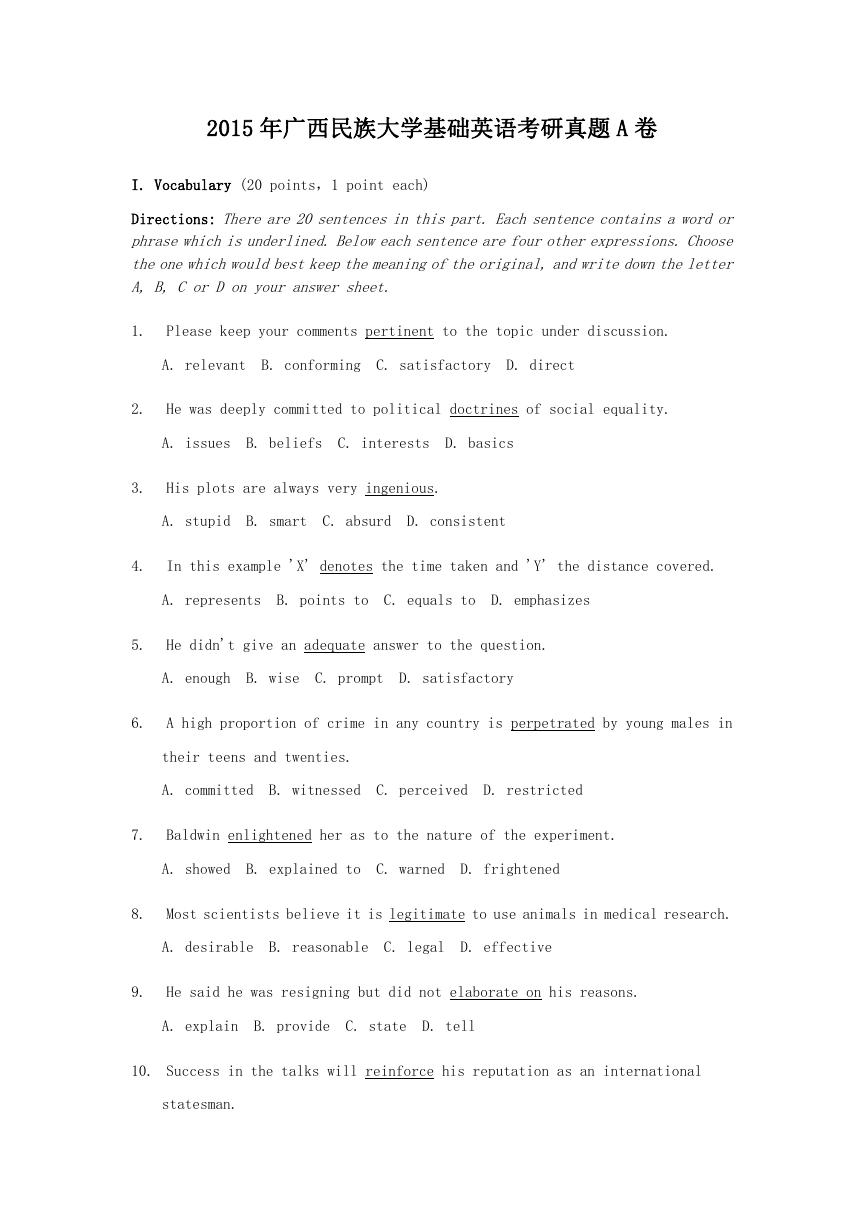
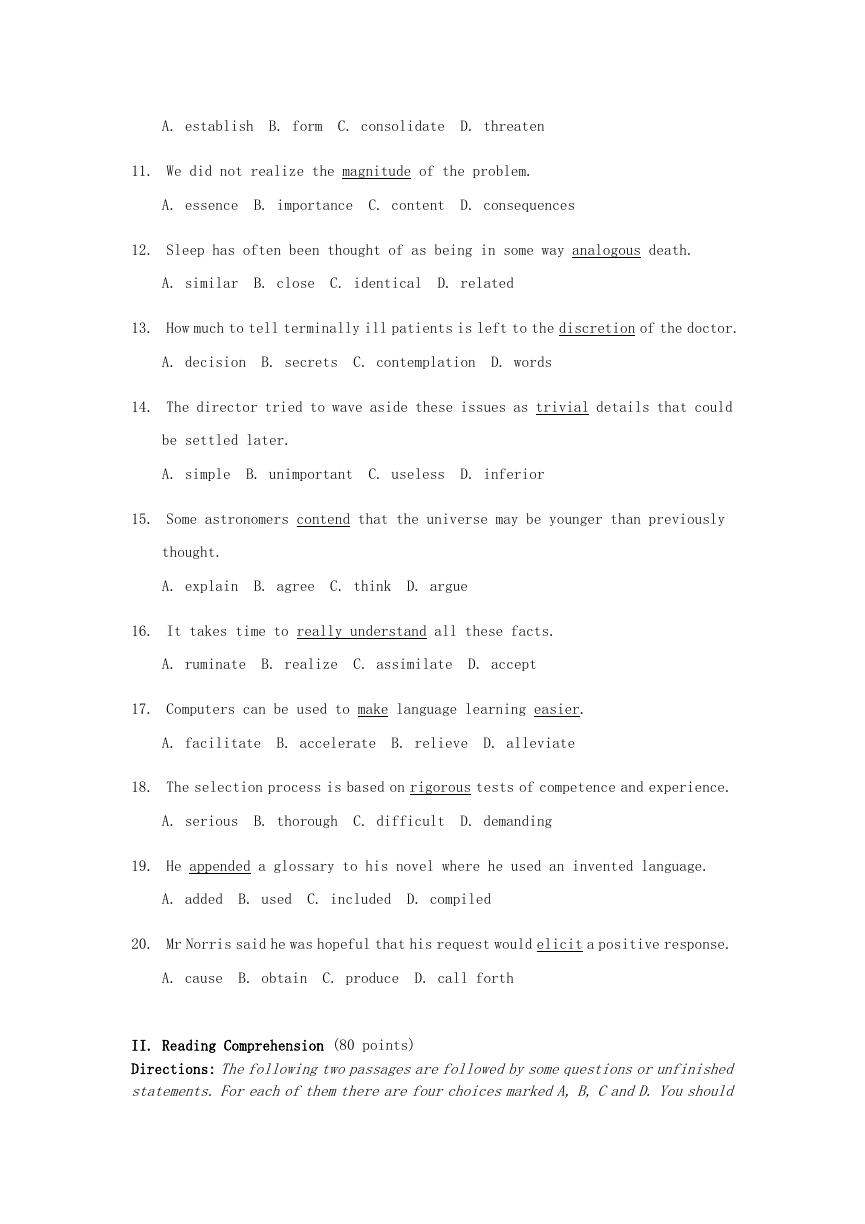
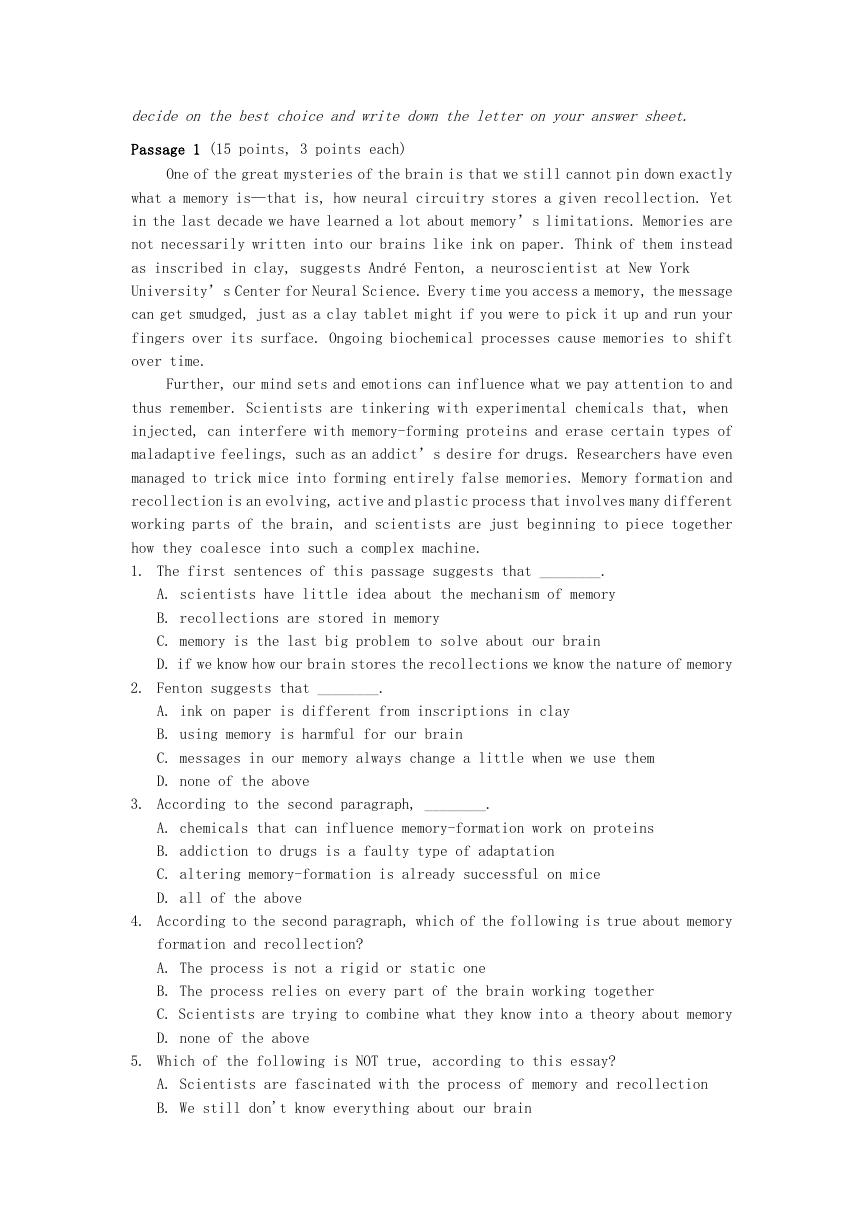
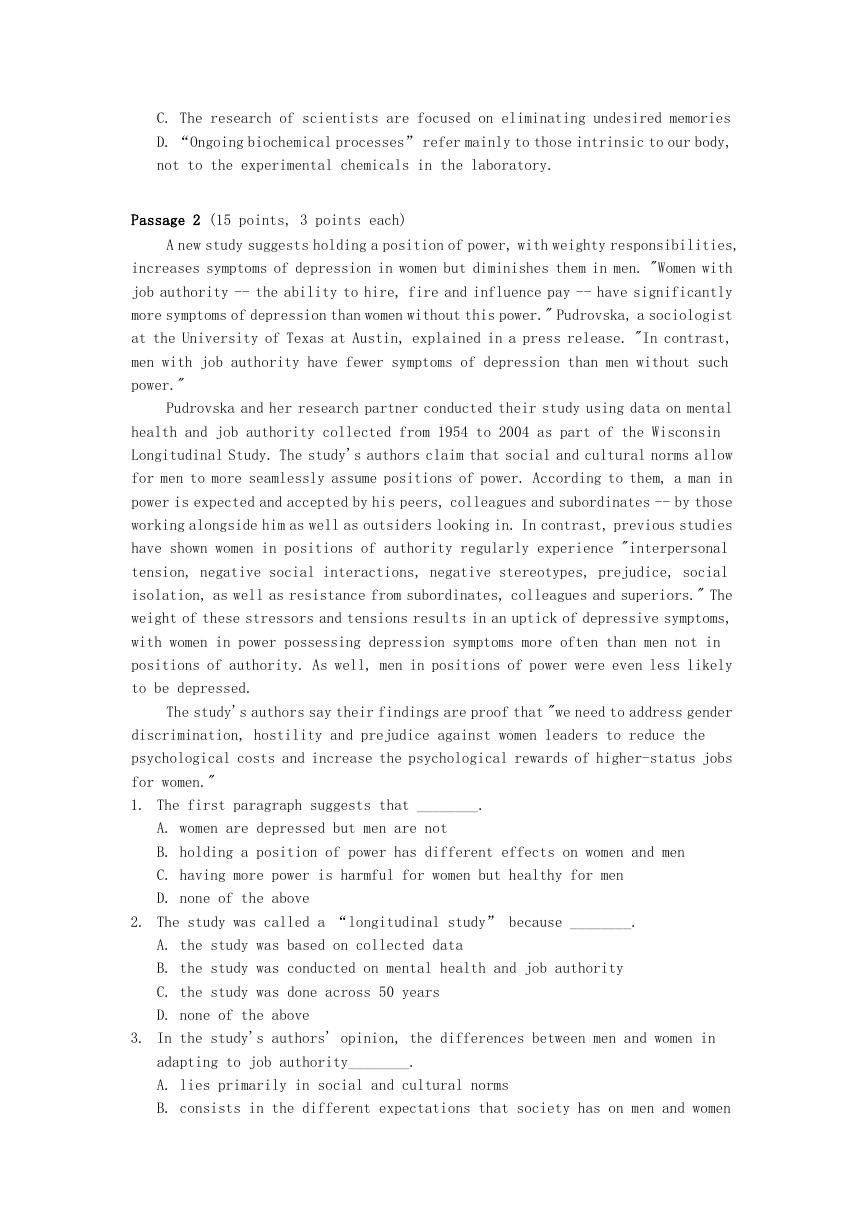
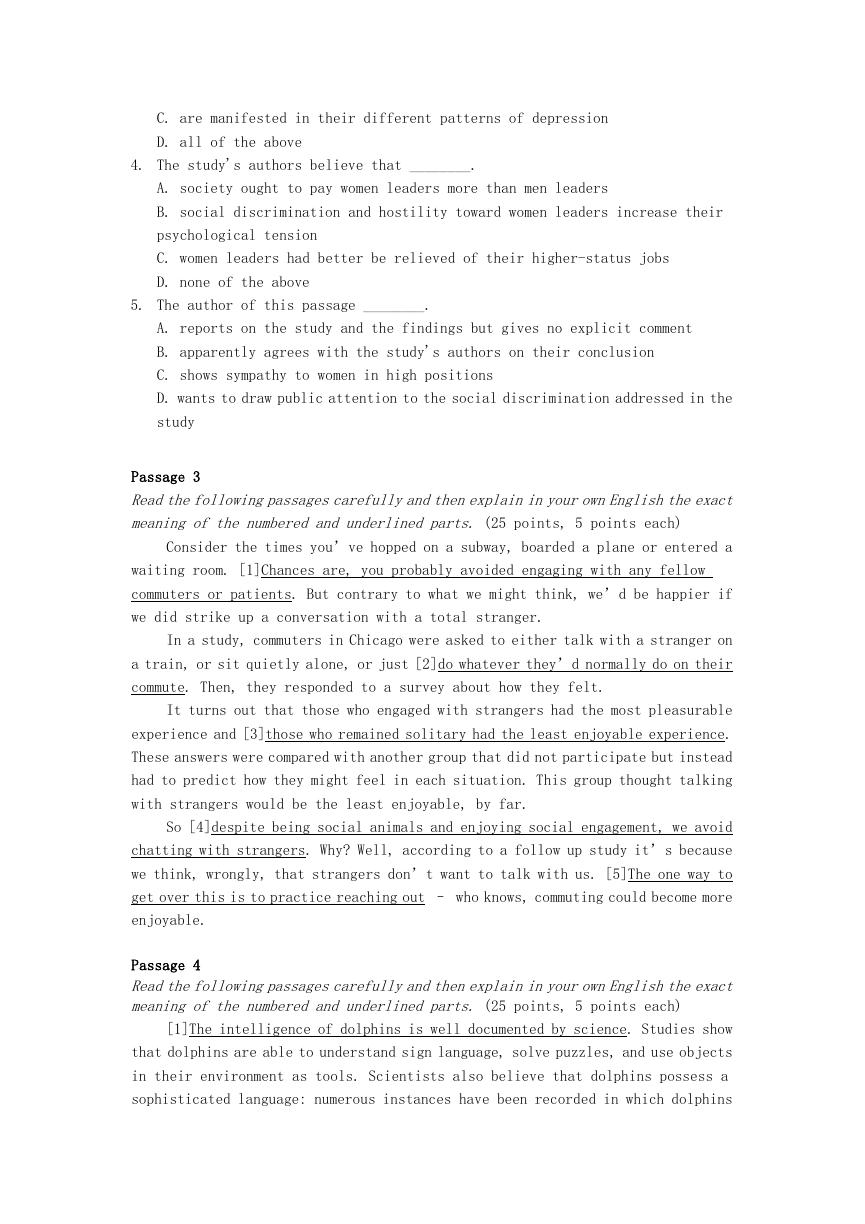
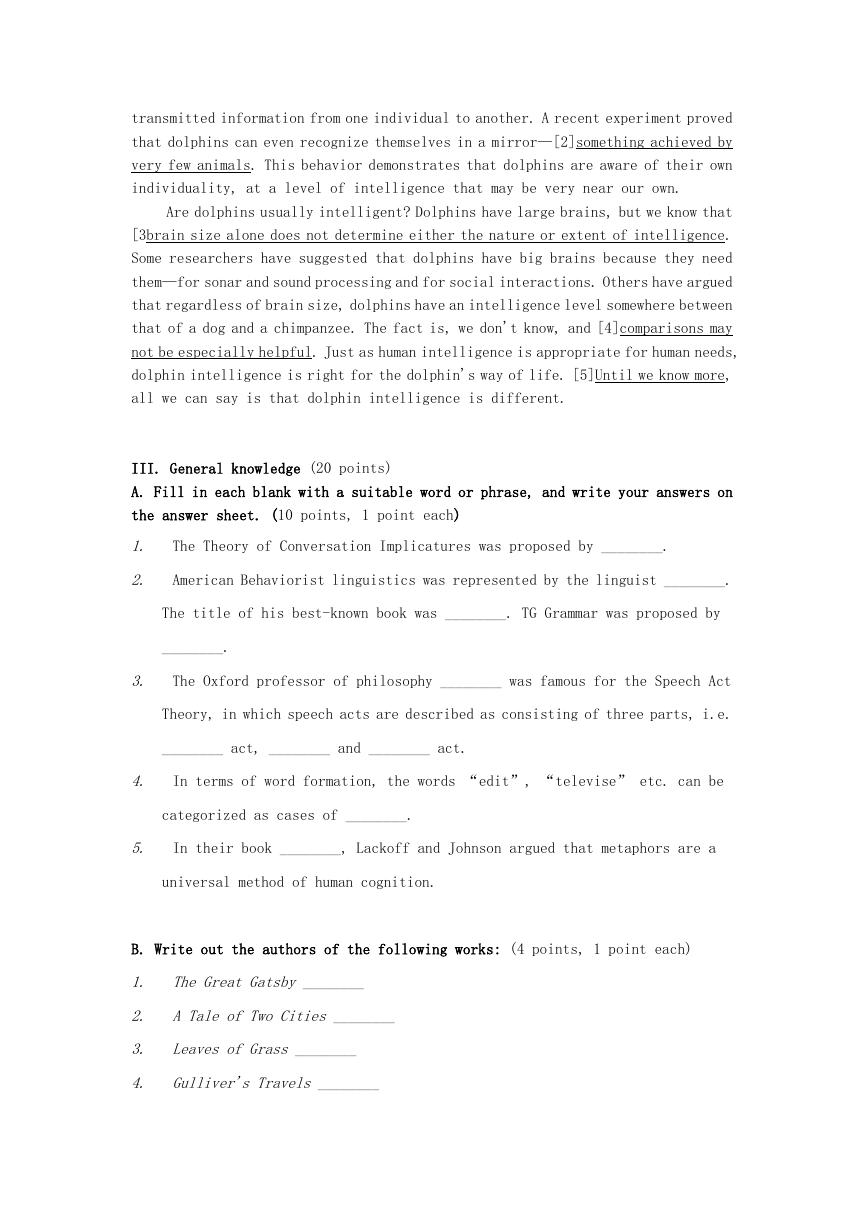
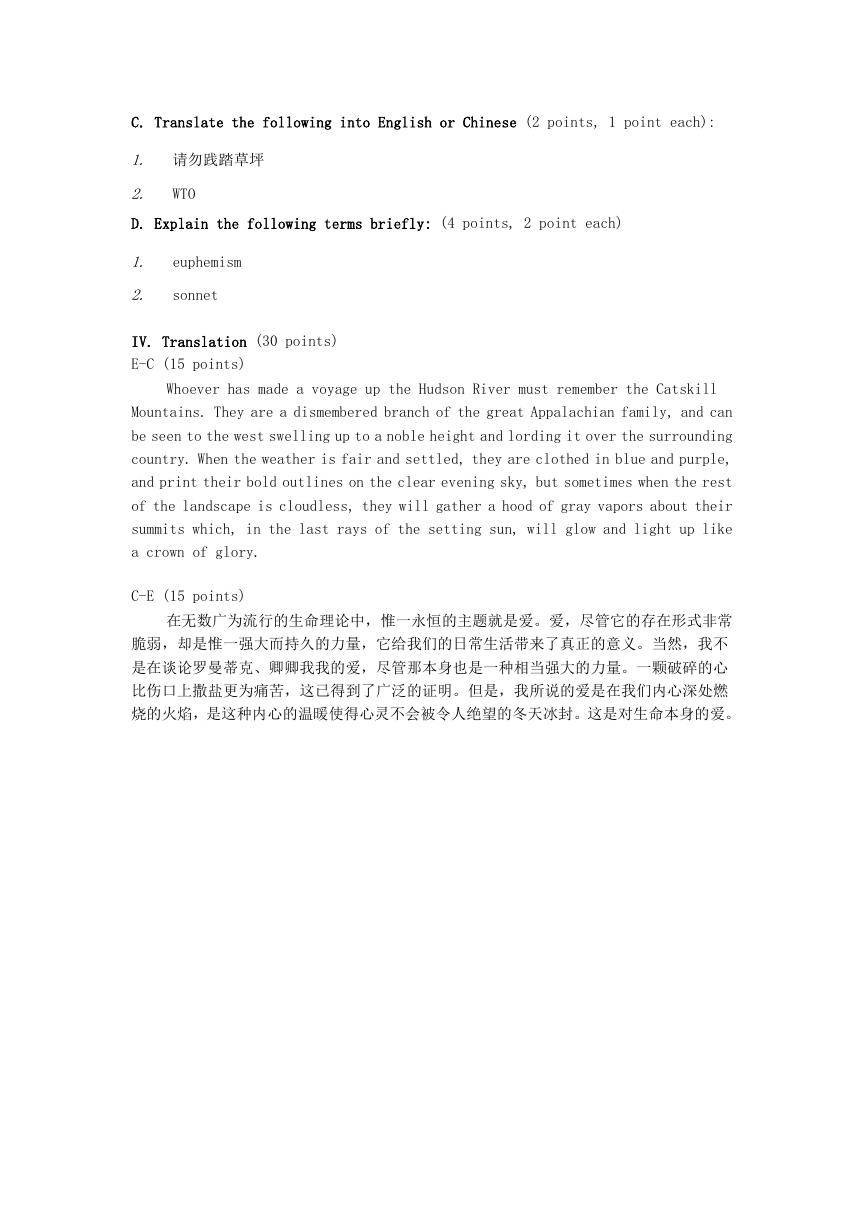







 2023年江西萍乡中考道德与法治真题及答案.doc
2023年江西萍乡中考道德与法治真题及答案.doc 2012年重庆南川中考生物真题及答案.doc
2012年重庆南川中考生物真题及答案.doc 2013年江西师范大学地理学综合及文艺理论基础考研真题.doc
2013年江西师范大学地理学综合及文艺理论基础考研真题.doc 2020年四川甘孜小升初语文真题及答案I卷.doc
2020年四川甘孜小升初语文真题及答案I卷.doc 2020年注册岩土工程师专业基础考试真题及答案.doc
2020年注册岩土工程师专业基础考试真题及答案.doc 2023-2024学年福建省厦门市九年级上学期数学月考试题及答案.doc
2023-2024学年福建省厦门市九年级上学期数学月考试题及答案.doc 2021-2022学年辽宁省沈阳市大东区九年级上学期语文期末试题及答案.doc
2021-2022学年辽宁省沈阳市大东区九年级上学期语文期末试题及答案.doc 2022-2023学年北京东城区初三第一学期物理期末试卷及答案.doc
2022-2023学年北京东城区初三第一学期物理期末试卷及答案.doc 2018上半年江西教师资格初中地理学科知识与教学能力真题及答案.doc
2018上半年江西教师资格初中地理学科知识与教学能力真题及答案.doc 2012年河北国家公务员申论考试真题及答案-省级.doc
2012年河北国家公务员申论考试真题及答案-省级.doc 2020-2021学年江苏省扬州市江都区邵樊片九年级上学期数学第一次质量检测试题及答案.doc
2020-2021学年江苏省扬州市江都区邵樊片九年级上学期数学第一次质量检测试题及答案.doc 2022下半年黑龙江教师资格证中学综合素质真题及答案.doc
2022下半年黑龙江教师资格证中学综合素质真题及答案.doc